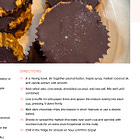Why your best friend’s wellness routine is failing you (and what bio-individuality has to do with it)
What works for me might not work for you and vice versa
Hey, friend! It’s Melissa here—an integrative nutrition health coach and the writer behind Grow Healthier + Happier. I’m here with your weekly dose of real-talk wellness, food tips, and intentional living to help you feel more energized, aligned, and lit up from the inside out.
Subscribe and let’s create your version of a wellness lifestyle. One that works for your real life and big dreams.
What is bio-individuality in health and wellness
Figure out what’s right for you, not the next wellness influencer on TikTok
Nutrition tips that apply to most of us
Action steps for your unique wellness journey
Drink double your body weight in ounces of water each day.
Eat slowly.
Go jogging if you want more energy.
Don’t eat refined sugar.
Cut carbs from your diet.
Only eat carbs at certain times.
Does any of this sound familiar?
What is bio-individuality
Bio-individuality is the idea that you are a one-of-a-kind human. No copies, no clones. What works for you isn’t automatically going to work for your best friend or your sister.
There are so many wellness gurus out there telling us to do different things to get or stay healthy, but we all have to take the advice with a grain of salt.
Your BFF might thrive on the Whole30 plan, but that doesn’t mean it is right for you.
What works for me might not work for you, and what works for you might not work for me.
You know best what foods, physical activity, sleep habits, and stress management methods are best for you.
Bio-individuality is a powerful force that is unique to each of us.
I first heard the term bio-individuality through my studies at the Institute of Integrative Nutrition.
It makes perfect sense.
It touches everything: the environment where you feel your best, the relationships that actually lift you up, and even what’s on your plate (or what’s not).
I hear new wellness trends all the time: eat more protein, make cottage cheese this or that (actually, I do love the cottage cheese trend), drink 32 ounces of water upon waking (holy cow, I could never), or drink colostrum! What!?
I might try a new trend, and find it a total bust for me. Eating a massive amount of protein doesn’t suit me well. It ultimately makes me overeat, so I found my happy protein amount and am thriving on that. That is my bio-individuality at play.
➡️ Here are some more examples of bio-individuality:
Not all workouts work for every body
You’ve probably heard someone talk about HIIT and how it changed their life. And hey, it might have truly been a game-changer for them. But for others? That kind of all-out effort just triggers a spike in stress hormones that ends up doing more harm than good.
Some of us feel stronger and more energized with low-impact strength workouts.
Others thrive with long walks, yoga, or a swim.
How your body responds to movement has a lot to do with your muscle fiber makeup, how your cardiovascular system works, and how quickly you recover.
Experiment and figure out what actually works for you.
Caffeine hits differently (literally)
Ever sip a half-caff at noon and feel like your heart is throwing a party inside your chest? Meanwhile, your bestie (me) downs a cold brew at 4 pm and can still sleep like a rock?
That’s genetics. Some people metabolize caffeine fast or burn it like it’s no biggie. Your genes affect not only how fast you process caffeine, but how it messes with your sleep and even your anxiety levels.
Coffee might boost focus for one person and derail another’s entire day. Know how it impacts you... And maybe skip the espresso after lunch if it keeps you up all night.
So, is there anything that sort of works for everyone?
Sleep!
Turns out, skimping on sleep messes with everything from your brain to your mood, metabolism, and immune system. Research on this has gone into overdrive, and we now know sleep isn’t just “nice to have,” it’s pretty much mandatory for clear thinking, strong emotional resilience, better memory, and basic everyday functioning.
I am in the lowest of moods when I don’t get enough sleep.
Chronic sleep deprivation quietly wrecks your body from the inside out and makes you way more sensitive to even tiny stresses. Experts say most healthy adults need about 7 to 7.5 hours a night to function like a decent human being.
Me… I need 8 to function at my best.
Prioritizing sleep could change your life.
3 simple nutrition tips that can work for almost everyone
Go veg!
Eating more vegetables is a win-win no matter how your body is wired. Dark, leafy greens like spinach and kale are linked to sharper memory and slower brain aging. They're also loaded with fat-soluble vitamins like E and K, plus folate, which helps keep inflammation in check.
But because we’re all a little different, it’s smart to experiment with how you eat them. If raw veggies like kale make your stomach stage a protest, try lightly sautéing them in olive oil or ghee to make those nutrients easier to absorb.
If raw greens sit well with you, have fun with it and build yourself a big leafy salad, snack on crunchy crudité with hummus, or get creative and make raw zucchini noodles tossed with pesto. Roasted sheet pan veggies are one of my favorite ways to consume veggies.
Action step: Try a few different ways of prepping veggies this week and pay attention to how you feel after each meal.
Hydration aka “drink more water”
Water might seem basic, but it’s one of the most underrated health moves out there. Your body depends on it for pretty much everything: energy, digestion, brain function, glowing skin, you name it. Even being slightly dehydrated can mess with your focus, mood, and how your body processes nutrients. Ever get a headache from a lack of water?
Some people feel great with the classic eight glasses a day, and others might need more depending on their size, activity level, or even where they live.
The goal isn't to obsess! It’s really important to pay attention to how your body feels.
*Tip* If you’re feeling sluggish, moody, or snacky when you shouldn't be, it might not be hunger. It may just be your body asking for more water.
Action step (1 minute prep): Start your day with a full glass of water before anything else (yes, even coffee). I pour my water the night before, as I can’t handle cold water in the morning. Drinking a full glass upon waking is easier if it’s not cold.
Then, keep a water bottle nearby and sip throughout the day. Notice how your energy levels respond.
On the subject of sugar
We’re wired to love sweet things. Thank you, biology, but holy smokes, modern life has absolutely drowned us in sugar. Our ancestors got their sugar fix naturally through fruits and honey, usually during harvest seasons.
But now…
Sugar shows up everywhere. Excess sugar is linked to fat storage, insulin resistance, diabetes, and obesity.
The tricky part is that it hides in everything from protein bars to your salad dressing.
Because you’re unique (bio-individuality), it's important to understand how you respond to different sugars. While sugars in fruit are natural, not added sugar, some people might feel a sugar crash regardless. This is where you can experiment with different fruits.
If you know me, you know I am a moderation girlie. I am not telling you to never eat sugar. I believe that if we eat well most of the time, our bodies will be forgiving of occasional indulgences.
Action step (5 minutes): Check labels this week for hidden sugars, and start a simple food/mood journal to track how sweets affect you.
Healthy fats for consistent energy
Did you know that fats are essential for your brain, heart, and nervous system to thrive?
Not all fats are equal.
Trans fats are industrial oils made to stay "fresh" forever in processed foods. Doesn’t that sound scary? They’ve been linked to inflammation, insulin resistance, and heart disease. If you see partially hydrogenated oils on an ingredient list, I’d suggest passing on that one.
Saturated fats are found in things like red meat, butter, and coconut oil. Saturated fat has been demonized, but if you look at it this way: saturated fat in fried foods is not healthy, but saturated fat in coconut oil can have health benefits. My take here is to simply eat in moderation.
→The healthy fat winners are monounsaturated and polyunsaturated fats. These fats have been shown to boost good cholesterol and protect against heart disease.
Monounsaturated fats are found in olive oil, avocados, and nuts such as almonds.
Polyunsaturated fats are found in fatty fish (salmon, tuna), nuts, and seeds (flaxseed, chia seeds).
Action step (5-10 minutes): Take a peek inside your pantry this weekend. Look at the types of fats you’re currently eating. If they fall into the unhealthy fats category, list healthy alternatives you can start leaning into: avocados, nuts, seeds, and extra virgin olive oil. Eliminate trans fats, or make it an occasional treat.
I hope this post has been helpful and inspiring for you.
Nurture your bio-individuality. Listen to your body. You know what’s best and you know what works for you.
If you’d like to further the discussion, message me, and we can chat more.
Healthy resource list
Don’t know what food to choose to start your healthy eating? I got you →Nutrient Cheat Sheet
Getting healthier is easier to start than you think (recipes included)→ Start here
I post this Weekly Meal Plan sheet every week in my kitchen. Planning ahead banished the weeknight meal planning stress.
More ways to connect with me:
📱️Join me on the socials: Instagram + Pinterest
ICYMI:
✨ Favs lately:
I’m knee deep in perimenopause, and Dr. Marie Claire Haver, MD, has been alongside me on the journey. I’ve been reading her books, The Galveston Diet and The New Menopause. This doc gets it! It’s not just weight gain and hot flashes — she talks about it all, and you’ll feel understood.
Tea tip for non-tea drinkers: I am not a tea drinker, but I secretly want to be! I want to enjoy the health benefits of green tea, but I don’t like it! Unless it’s a matcha latte. Sooooo… to get more green tea in my life, I make cold brew green tea and use it as a liquid smoothie base or I mix in other teas for taste (like rose or hibiscus) and then add seltzer to make it pop. 🍵
Got a wellness or nutrition question you've been dying to ask a health coach? Drop it in the comments or slide into my DMs—I’d love to help! 💬✨
Cheers to your uniqueness ~
All material on the Grow Healthier + Happier publication is provided for educational purposes only are not intended to treat, diagnose, cure or prevent any disease. Always seek the advice of your physician for any questions you have about a medical condition, and before undertaking any diet, exercise or other health-related programs.














I agree with you on everything you say except one thing. Kale sucks. There. I said it.
Thanks for another great post full of insights Melissa! I've found my bio-individuality has also changed as I've aged. I used to be a caffeine fiend, but now I can't tolerate it - even drinking in the morning keeps me awake! I'm reduced to drinking decaf which just doesn't taste as good!!! And following the perimenopause advice to up my protein definitely backfired for me...